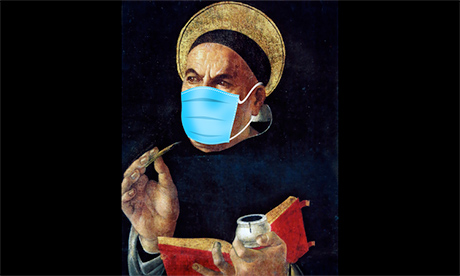What is the proper spiritual response to the coronavirus pandemic?
Although many Catholics seek to use this period as “a time of renewal,” as one priest put it, a vocal minority are approaching the pandemic with words more suited to culture warriors than to spiritual warfare.
Any Catholic who has spent time on social media has probably encountered members of the faithful who are deeply suspicious of public health precautions.
They will admit that people who are particularly vulnerable to Covid-19 are worthy of special protection. But they resist as overzealous government intrusion any precaution that might impede upon their personal right to celebrate the sacraments.
This mentality of suspicion leads some Catholics to deride those who observe public health precautions as cowards who have capitulated to a spirit of fear.
To support their uncharitable attacks, they point to Jesus’ teaching (as in Mt 16:26) that the soul is more valuable than the body.
Some even go so far as to assert that Catholics who refrain from attending public liturgies out of fear of Covid-19 are lukewarm in their faith.
How, then, to respond to those who claim that Catholics who heed health guidance are giving themselves over to an un-Catholic “slavery…by their fear of death” (Heb 2:15)?
I suggest consulting St. Thomas Aquinas. In his Summa Theologiae, St. Thomas offers profound observations on fear and the virtue that remedies it, fortitude. Some points he makes are especially relevant to today’s debates.
There is no sin in fearing the needless loss of one’s life or health.
A sin is by definition an unreasonable act. But, Aquinas says, “reason dictates that we should shun the evils that we cannot withstand, and the endurance of which profits us nothing. Hence there is no sin in fearing them.”
The answer to fear is not defiance. It is fortitude.
Our fear should lead us to ask God for an increase in the cardinal virtue of fortitude.
But practicing fortitude does not mean tempting God by being reckless. Rather, Aquinas says, fortitude strengthens us by “curbing fear and moderating daring.”
The words of the Serenity Prayer offer an example of fortitude in action: “God, grant me the serenity to accept the things I cannot change, courage to change the things I can and wisdom to know the difference.” Although the “wisdom to know the difference” comes from the virtue of prudence, which directs the other cardinal virtues, the “serenity to accept the things I cannot change” and “courage to change the things I can” are both aspects of fortitude.
And this brings us to our final point from Aquinas: The principal act of the virtue of fortitude is not aggression. It is endurance.
Sometimes it is necessary to attack our fears head-on. A priest I know faces his fear of Covid-19 so that, taking every reasonable precaution, he may bring the sacraments to patients in hospitals who are dying of the virus.
Aquinas grants there are times when one has no other option than “aggression”—taking bold action against that which causes fear. Even so, he takes care to emphasize that “the principal act of fortitude is endurance, that is to stand immovable in the midst of dangers rather than to attack them.”
But St. Thomas does not stop there. Continue reading
Additional readingNews category: Analysis and Comment.




